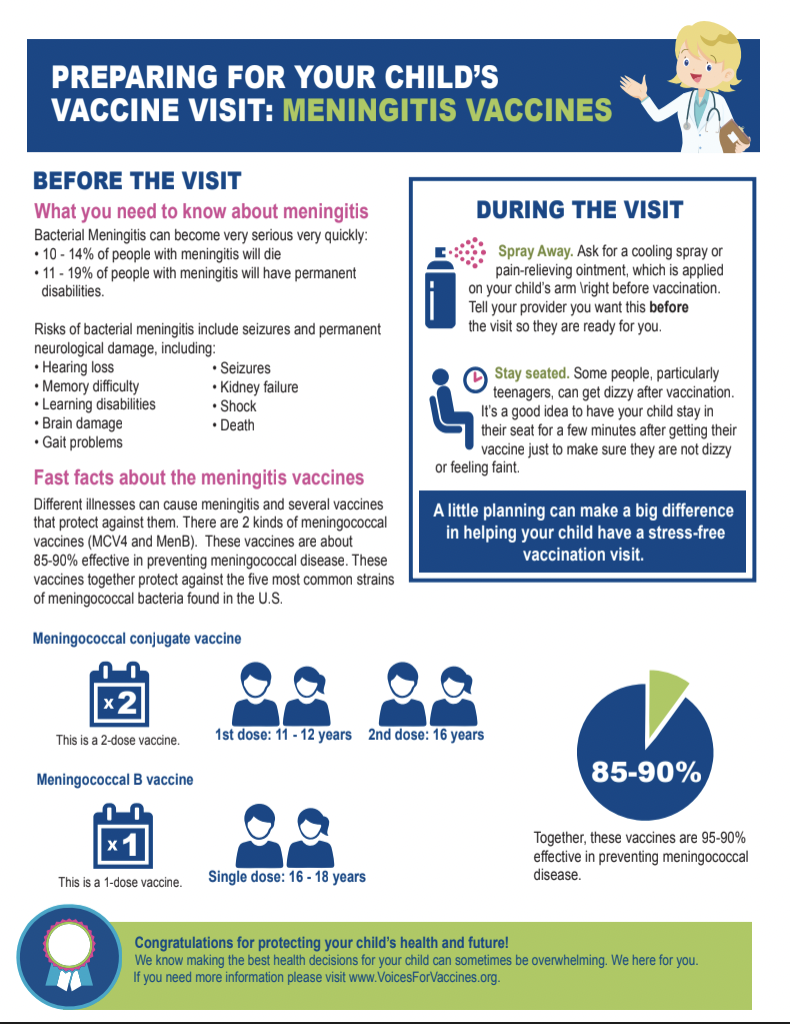Meningococcal Vaccines
What is Meningitis?
Meningococcal disease is caused by bacteria called Neisseria meningitidis, also called meningococcus. It can strike quickly and is often severe. Although this vaccine is often called the meningitis vaccine, this name isn’t quite accurate because meningitis has multiple causes, including other infections and injuries, and because the vaccine protects against several strains of N. meningitidis that cause multiple illnesses.
Although meningococcal disease is uncommon, teens and young adults 16 through 23 years old are at increased risk. Meningococcal bacteria can cause severe, even deadly, infections like
- Meningitis (an infection of the lining of the brain and spinal cord)
- Bacteremia or septicemia (bloodstream infections)
It is spread through person-to-person contact, by coughing, or through close contact with someone who carries one of the bacteria.
Symptoms of meningitis usually appear very suddenly and include:
- Fever
- Headache
- Stiff neck
- Nausea
- Vomiting
- Photophobia (light sensitivity)
- Confusion
Newborns and babies may have different symptoms, including:
- Being slow or inactive
- Being irritable
- Vomiting
- Feeding poorly
- Bulging fontanelle (the soft spot on an infant’s head)
- Abnormal reflexes
The symptoms of bacterial meningitis usually show up 3 – 7 days after being exposed. Bacterial meningitis progresses very quickly. Later symptoms can be very serious, including seizure and coma.
Bacterial meningitis can be fatal; it is extremely important to call your doctor right away if your child has any early symptoms.
What are the risks of meningococcal disease?
Meningitis can be very serious:
- 10 – 14% of people with meningitis will die
- 11 – 19% of people with meningitis will have permanent disabilities.
Risks of meningitis include seizures and permanent neurological damage, including:
- Hearing loss
- Memory difficulty
- Learning disabilities
- Brain damage
- Gait problems
- Seizures
- Kidney failure
- Shock
- Death
Symptoms of meningococcal septicemia may include:
- Fever and chills
- Fatigue (feeling tired)
- Vomiting
- Cold hands and feet
- Severe aches or pain in the muscles, joints, chest, or abdomen (belly)
- Rapid breathing
- Diarrhea
- In the later stages, a dark purple rash
About 1 in 5 people who survive their meningococcal infection have permanent disabilities.
How effective are the vaccines that protect against meningitis?
Different illnesses can cause meningitis and several vaccines that protect against them. There are 2 kinds of meningococcal vaccines (MCV4 and MenB). These vaccines are about 85-90% effective in preventing meningococcal disease. These vaccines together protect against the five most common strains of meningococcal bacteria found in the U.S.
How safe are the vaccines that protect against meningitis?
Both the Meningococcal conjugate vaccine and the Meningococcal B vaccine are very safe, and serious side effects are extremely rare. About half of the people who get the vaccine will have pain/redness where the vaccine was given or a mild fever.
When should my child get the vaccines that protect against meningitis?
Different infections can cause complications, including meningitis. It is important to protect your family from all the diseases that can cause meningitis. Talk to your healthcare provider about which vaccines your family members need:
- Meningococcal conjugate vaccine: First dose at 11 – 12 years old with a booster dose at 16 years old. Teens and young adults (16 – 23 years of age) also may get a serogroup B meningococcal vaccine.
- Meningococcal B vaccine: The MenB vaccine should be given to teenagers between 16 – 18 years of age.
What can I expect at a Meningococcal vaccine appointment?
A little research before your child’s well baby visit can go a long way to reducing your stress and concerns. Credible information helps ensure healthy choices and builds vaccine confidence.
Meningococcal vaccine Fact Sheet
Is your child due for a meningitis vaccine? Read our Meningococcal vaccines fact sheet to prepare for your appointment.
Where can I get more information?
These organization are vaccine experts and can provide credible information:
How do I know this information is credible?
We work for parents so we make sure that parent concerns are addressed using facts and science and our content is reviewed by experts who have spent their careers studying vaccines. Learn more about how we ensure we are bringing you the best information to help you make healthy choices for your family.
Know the risks: Meningitis

Meningitis happens quickly and can be hard to diagnose at first.
The longer it goes untreated, the more serious the complications – including death within 24 hours.
Even with treatment…
1 in 5 people with have a permanent disability:

and 1 in 10 people will die:

The lasting effects of meningitis are devastating.
Why take the risk?
Don’t let anyone tell you different: The vaccine is ALWAYS safer than the disease





